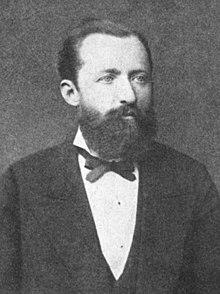August Šenoa
This article includes a list of general references, but it lacks sufficient corresponding inline citations. (January 2011) |
August Šenoa | |
|---|---|
 | |
| Born | August Ivan Nepomuk Eduard Schönoa 14 November 1838 |
| Died | 13 December 1881 (aged 43) |
| Nationality | Croatian |
| Occupation | Novelist |
August Šenoa[pronunciation?] (originally Schönoa; 14 November 1838 – 13 December 1881) was a Croatian novelist.
He was a transitional figure, who helped bring Croatian literature from Romanticism to Realism and introduced the historical novel to Croatia. He wrote more than ten novels, among which the most notable are:
- Zlatarovo zlato (Goldsmith's gold; 1871)
- Čuvaj se senjske ruke (Pirates of Senj; 1876)
- Seljačka buna (Peasants' revolt; 1877)
- Diogenes (1878)
Šenoa was one of the most popular Croatian novelists and the author of the popular patriotic song "Živila Hrvatska".
Life

He was born in Zagreb, then part of the Habsburg Empire, into a family of Slovak-German origin. His surname was originally spelled Schönoa. His father was Alois Schönoa, and mother was Terezija Rabacs, a Slovak woman from Budapest. He studied law in Prague. He also lived in Vienna for a while, but returned to Zagreb in 1866. He died in Zagreb at the age of 43.
From 1874 to 1881, he edited the literary journal Vijenac ("Wreath").
He died from disease picked up after the 1880 Zagreb earthquake.
Work
In his novels, he fused national romanticism characterized by buoyant and inventive language with realistic depictions of the growth of the petite bourgeois class.
This "father of the Croatian novel" (and modern national literature) is at his best in his mass Cecildemillean scenes and poetic description of oppressed Croatian peasantry, nobility struggling against foreign rule (Venetians, Austrians/Germans and Hungarians) and romanticised period from the 15th to the 18th century. It has become a commonplace phrase that "Šenoa created the Croatian reading public", especially by writing in a popular style.
Legacy
In 2008, a total of 182 streets in Croatia were named after August Šenoa, making him the seventh most common person eponym of streets in the country.[1]
References
- ^ Letica, Slaven (29 November 2008). Bach, Nenad (ed.). "If Streets Could Talk. Kad bi ulice imale dar govora". Croatian World Network. ISSN 1847-3911. Retrieved 31 December 2014.
{{cite web}}: Unknown parameter|editorlink=ignored (|editor-link=suggested) (help)
Sources
- August Šenoa at the Zagreb City Museum
